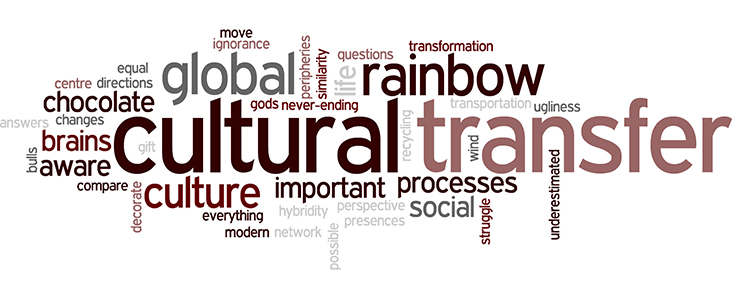Manuela Rossini and Mike Toggweiler are editing an issue of Word & Text on “cultural transfer”. We are happy to announce our call for papers and welcome abstracts from interested scholars until 27 June 2014.
Archiv der Kategorie «Uncategorized»
Between heterogeneity and homogeneity – guest lecturer Anil Bhatti from Jawaharlal Nehru University of New Delhi emphasizes the advantages of considering cultural processes in terms of similarity
Entrapped by my mobile phone? – guest lecturer Hans Peter Hahn from Goethe University Frankfurt explains why it could be misleading to talk of a proper agency of non-organic things
Tales from the crypt – watch how guest lecturer Marianne Sommer from the University of Lucerne sheds some light on hominid bones as an example of knowledge transfer within anthropological discourse and beyond
An elevation of culture – guest lecturer Helga Mitterbauer from the University of Alberta explains why we should consider culture as transfer
The benefits of an academic ivory tower – postdoctoral scholars Sylvia Karastathi and Katharina Wessely from the University of Berne talk about interdisciplinary encounters by way of travelling concepts such as “cultural transfer”
Beyond nature-culture – Watch PhD candidate Jacqueline Dalziell from the University of New South Wales explaining why slime molds might undermine an anthropocentric notion of cultural transfer
Hi All,
Hope everyone is well.
A quick note to again thank Manuela and Mike for their tremendous organisational efforts in putting together a fantastic Winter School.
I thought this Summer School coming up soon may be of interest to some:
Thanks,
Jac
I remain to be convinced.
Contemporary and past social interaction is characterised, I believe, by a constant exchange and interchange across cultures. The fundamental problem of the concept of cultural transfer lies in its emphasis on certain and specific processes. By describing one from of exchange as a cultural transfer, it inexplicitly stipulates that other cultural forms, idioms and objects and knowledge remain fixed and fixated within the boundaries of culture (or often simply the nation state). Despite intending and purporting the opposite, in the application of the concept of cultural transfer scholars have to assume a fixation of culture and knowledge as a contrast to the “fluidity” they analyse and depict. This reduction of complexity is surely a dead-end and misleading.


